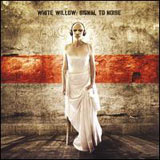|
||||||
|
These days Norway’s White Willow is always placed into the prog-rock category; but “progressive” seems to be a bit of a misnomer for this band. Their early material is rooted in a more folk-rock melancholia whereas they began to explore a slightly heavier—relatively speaking—more progressive sound on their third album, Storm Season. They’ve undoubtedly always had progressive tendencies, but they fall in line with latter day The Gathering with a slightly more dreamy, atmospheric pop sound. That sort of description may turn some people off, but Signal To Noise has far more depth than the picture that simple verbal sketch suggests. Like the post-Nighttime Birds material from The Gathering, White Willow wistfully wanders through ethereal soundscapes on Signal To Noise. The music offered here is a mix of progressive rock, light electronica, gothic shoegaze, folk, and pop musings. New vocalist Trude Eidtang adds another layer with her sweet, airy, and engaging vocals, a style that seems right at home floating over the myriad shifting musical currents. “Night Surf” opens the album. It’s a slow- to mid-paced song punctuated by flute and lithe electronic effects, minimal guitar work, and a captivating vocal performance by Eidtang. “Splinters” and “Ghosts” follow a similar path, though the latter does so without vocals. Comparisons to The Gathering are reinforced through the first three tracks, but with the fourth track, “Joyride,” the band places a solid wedge between themselves and The Gathering, and any other progressive rock band or comparison, opting for a more dream pop style similar to something you’d hear from Emm Gryner or Box The Walls. “The Lingering” is an outstanding 9-minute opus of melancholic darkness, the heaviest number on the album. White Willow’s folk-rock roots are laid bare on “The Dark Road” and the instrumental “Chrome Dawn,” while “Dusk City” is easily the most traditional progressive rock-sounding song on Signal To Noise. A short, quiet instrumental called “Ararat” ends the album on a less-than-powerful note, considering the kind of imagery the word Ararat invokes. White Willow can be a tough act to indulge in, especially for a strict progressive rock/metal fan. The emotions that Signal To Noise evokes while listening to the album can put the listener ill at ease, because there is no emotional theme presented throughout the album. One song is a dark, poetic display of sorrow, while the next has a pop bounce or a folk-like lilt that kind of tosses the album around on its axis a bit. But if you give Signal To Noise a good once-over with an open mind you may find something very enjoyable. Prog-rock sticklers should avoid White Willow since the progressive part of their music is a very deep undercurrent. MP3: Dusk City VIDEO: Joyride (Fan-made video) Note: In time these links will likely becoming outdated. |
||||||
|
Killing Songs : Night Surf, The Lingering and Dusk City |
Ken quoted 65 / 100 | |||||
|
||||||


There are 1 replies to this review. Last one on Tue Jan 23, 2007 1:19 am
View and Post comments